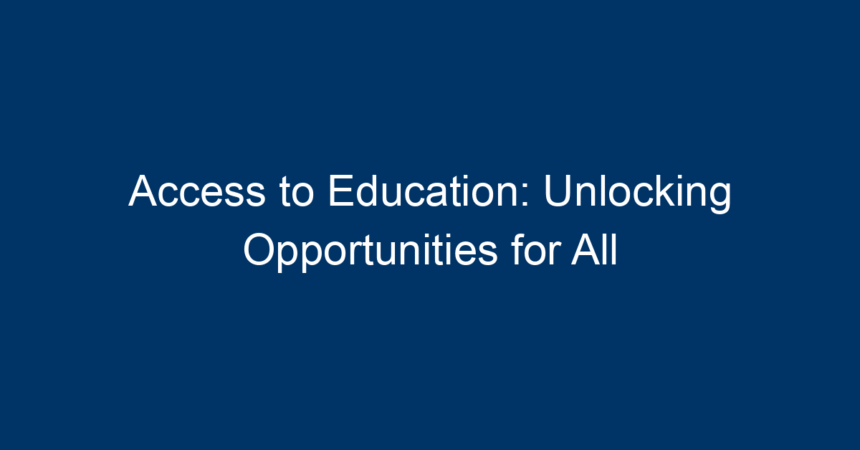In a world constantly evolving with technological advances and dynamic job markets, access to education remains a cornerstone of personal development and economic prosperity. Education is not just a privilege; it’s a fundamental human right. However, millions of people around the globe still struggle to obtain basic educational resources due to various barriers. This article explores the importance of access to education, its societal impact, current challenges, and actionable strategies to promote inclusive education for all.
Understanding Access to Education
Access to education refers to the ability of individuals to gain entry to educational institutions and resources, including schools, libraries, and online learning platforms. It encompasses not only enrollment, but also the quality of education provided, the availability of teaching staff, and the financial resources required to pursue an education.
The Importance of Education in Society
Education is often described as the great equalizer. It empowers individuals, enhances social mobility, and fosters the development of informed citizens. The benefits of education ripple throughout society:
-
Economic Growth: A well-educated workforce is vital for economic development. Countries investing in education typically see higher GDP rates, as education correlates strongly with innovation and productivity.
-
Health Improvements: Education leads to better health outcomes. Studies indicate that educated individuals tend to make informed health choices, reducing healthcare costs and improving quality of life.
- Social Cohesion: Education promotes understanding and tolerance among diverse groups. By providing a shared experience, it helps create a cohesive society where individuals respect one another’s differences.
Current Barriers to Accessing Education
Despite the significant benefits, numerous barriers still exist that obstruct access to education. Here are some of the most pressing challenges:
Economic Constraints
Financial limitations are among the most significant barriers to education. Families living in poverty often cannot afford tuition, school supplies, or transportation. This situation is especially dire in developing regions where educational funding is already limited.
Geographic Barriers
In many rural areas, schools are few and far between, forcing students to travel long distances. The lack of infrastructure often discourages families from sending their children to school, particularly girls, who are often held back due to cultural or safety concerns regarding travel.
Social Inequalities
Discrimination based on gender, ethnicity, and disability can significantly impact access to education. For example, girls in certain regions are less likely to receive education compared to boys due to systemic biases and socio-cultural expectations.
Quality of Education
Access is not merely about physical availability; it also encompasses the quality of education. Overcrowded classrooms, underqualified teachers, and inadequate educational materials can diminish the learning experience, making it less appealing for students.
The Role of Technology in Enhancing Access to Education
In today’s digital age, technology has the potential to transform the educational landscape, making education more accessible than ever before.
Online Learning Platforms
Online courses and educational resources can bypass geographical limitations, providing opportunities for learners in remote areas. Platforms like Coursera, Khan Academy, and edX offer courses from top institutions, making high-quality education available to anyone with an internet connection.
Mobile Learning
With the proliferation of smartphones, mobile learning has become a reality. Apps and educational tools designed for mobile use allow students to learn anytime, anywhere. This flexibility is particularly essential for working learners and those juggling multiple responsibilities.
Open Educational Resources (OER)
OERs are valuable resources made available freely, allowing educators and learners to access high-quality materials without financial burden. These resources can be adapted to suit different learning environments and preferences, thus promoting wider access to educational content.
Strategies for Improving Access to Education
Improving access to education requires coordinated efforts from various stakeholders, including governments, NGOs, and communities. Here are actionable strategies to enhance educational opportunities for all:
Policy Reforms
Governments should prioritize education in their budgets, focusing on policies that promote universal access. This includes funding for public education, scholarships for disadvantaged students, and initiatives aimed at reducing educational inequalities.
Community Involvement
Community engagement is crucial for promoting education. Local organizations can provide support to families, offering resources such as tutoring programs, scholarships, and workshops to raise awareness about the importance of education.
Public Awareness Campaigns
Raising awareness about the value of education can change societal attitudes. Campaigns targeting parents and communities can help alter perceptions that hinder access, encouraging a culture that prioritizes education for all children.
Teacher Training Programs
Quality education is dependent on well-trained teachers. Investing in teacher development ensures that educators are equipped to provide effective instruction and create an inclusive learning environment.
Case Studies: Successful Initiatives in Access to Education
Kenya’s Universal Primary Education Program
Kenya has made remarkable strides in access to education through its Universal Primary Education (UPE) initiative. Since its implementation, the program has significantly increased enrollment rates, especially among girls, by offering free primary education and providing necessary learning materials.
The Malala Fund
Founded by Nobel laureate Malala Yousafzai, the Malala Fund advocates for girls’ education worldwide. The organization invests in local education advocates and empowers young girls by providing scholarships. Its work has opened doors for countless girls who would otherwise be denied educational opportunities.
Educate Girls: A Successful NGO Model
Educate Girls is a non-profit organization in India aimed at empowering girls through education. By actively engaging communities, providing scholarships, and enhancing school infrastructure, the organization has successfully increased enrollment rates significantly in underserved areas.
Conclusion: A Collective Effort Towards Inclusive Education
Access to education is a fundamental right that must be ensured for every individual, regardless of their background. By acknowledging existing barriers and actively working to dismantle them, we can create an inclusive educational landscape.
Actionable Insights:
-
Support Local Initiatives: Engage with and support local organizations that aim to bolster educational access in your community.
-
Advocate for Change: Use your voice to advocate for educational policies that promote inclusion and equity.
- Invest in Education: Whether through funding scholarships, volunteering time, or promoting educational resources, everyone can contribute to making education accessible.
Education unlocks opportunities and is vital for individual and collective growth. Let’s work together to ensure that everyone has the chance to learn, grow, and thrive through access to education.




